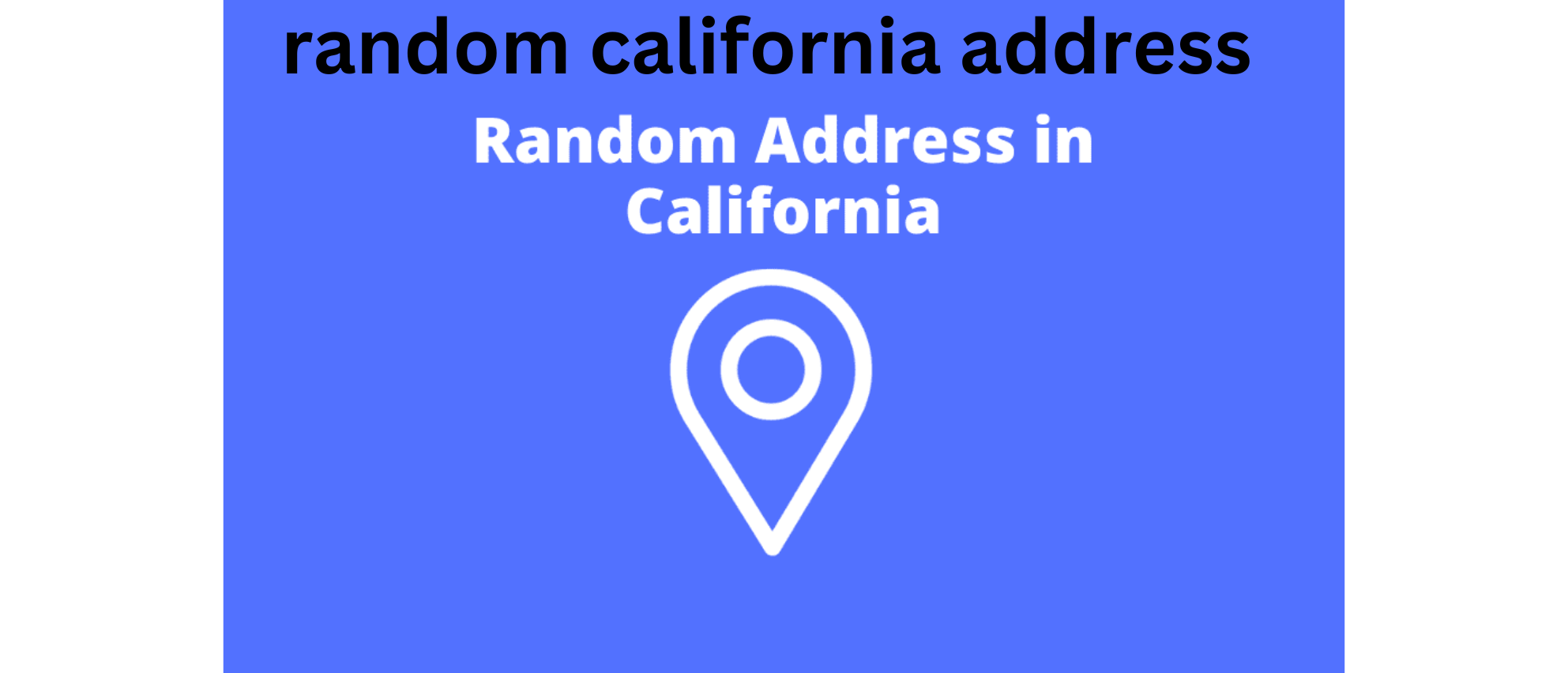
The Significance of Random California Addresses
In today’s digital age, the need for accurate and valid addresses is more critical than ever. Having a correct address is essential for online shopping, shipping packages, or legal documentation. However, there are instances where one might require a random California address for testing purposes, data entry, or privacy concerns. In this article, we delve into the significance, challenges, and ethical considerations surrounding the use of random California addresses.
Defining a Random California Address
A random California address refers to a fictitious or fabricated address within the state of California, USA. These addresses are not associated with any real location or individual and are often used for various non-official purposes. Certainly! When we talk about a random California address, we’re referring to an address within the state of California that is not linked to any actual location or person. These addresses are typically fabricated or fictitious and are used for purposes that don’t require genuine address information, such as testing software or protecting privacy.
Importance of a Valid Address
Addresses play a crucial role in numerous aspects of daily life. From receiving mail to accessing services, a valid address is a fundamental piece of information required by individuals, businesses, and government entities alike. A valid address ensures that correspondence and packages reach their intended recipients without any issues or delays.
It provides a means for businesses to communicate with their customers and for individuals to receive important documents, bills, and notices. Additionally, a valid address is often required for various legal and administrative processes, such as applying for identification cards, driver’s licenses, voter registration, and tax filings. We’ll discuss in this article about random california address.
The Significance of California Addresses
California, being one of the most populous and economically significant states in the US, holds particular importance concerning addresses. The state’s diverse geography and large population make it a focal point for address-related activities, including shipping, e-commerce, and service provision. We’ll discuss in this article about random california address.
California addresses hold significant importance due to several reasons. As one of the most populous and economically influential states in the United States, California is a hub for various industries, businesses, and communities. Consequently, addresses within California play a crucial role in facilitating numerous activities and transactions, both within the state and beyond.
Challenges with Generating Random Addresses
Generating random addresses, especially in a specific location like California, poses several challenges. Ensuring the address format adheres to the standards, avoiding duplication, and maintaining a semblance of authenticity are some of the hurdles faced in this process. We’ll discuss in this article about random california address.
One of the primary challenges is ensuring that the randomly generated addresses conform to the standard address format used in California. This format typically includes elements such as the street number, street name, city, state, and ZIP code. Ensuring that each component is correctly formatted and valid is essential to creating addresses that can be recognized and processed by systems and services.
Legal Implications of Using False Addresses
Using false or random addresses for official purposes can have severe legal repercussions. It may constitute fraud, misrepresentation, or identity theft, leading to civil and criminal liabilities. Moreover, using false addresses may also violate specific laws and regulations related to identity theft and identity fraud.
In many jurisdictions, impersonating another person or using their address without permission is illegal and punishable by law. Individuals who use false addresses for such purposes may face criminal prosecution and imprisonment. We’ll discuss in this article about random california address.
How Random Addresses Are Generated
Various methods and algorithms are employed to generate random addresses. These may involve combining real address components with fictional elements or using software programs specifically designed for this purpose. One common method of generating random addresses is to combine real address components with fictional elements. For example, the street names, city names, and ZIP codes used in the generated addresses may be randomly selected from lists of real locations while ensuring that the combination does not correspond to any actual address.
Tools and Websites for Generating Random California Addresses
Several online tools and websites offer the generation of random addresses, including those specific to California. While some are legitimate and serve practical purposes, others may facilitate fraudulent activities.
- FakeAddressGenerator.com: This website allows users to generate random addresses for various countries, including the United States. Users can specify the state (California, in this case) and the number of addresses they need. The generated addresses include street names, cities, ZIP codes, and even phone numbers. We’ll discuss in this article about random california address.
- RandomLists.com: RandomLists offers a random address generator tool that allows users to generate addresses for specific states, including California. Users can customize the format of the addresses and choose whether to include additional details such as apartment numbers or street suffixes.
- FakeNameGenerator.com: While primarily focused on generating fake identities, FakeNameGenerator also provides randomly generated addresses for different countries and states, including California. Users can select the desired state and receive a fictitious address along with other personal information.
Risks Associated with Using Random Addresses
Using random addresses entails inherent risks, both for individuals and businesses. These include undelivered mail, identity verification issues, and potential legal consequences if the fabricated address is discovered.
- Undelivered Mail: One of the primary risks is the possibility of mail being sent to a random address not reaching its intended recipient. This can lead to important documents, packages, or correspondence being lost or returned to the sender, causing delays, inconvenience, and potential financial loss.
- Identity Verification Issues: Using random addresses for official purposes, such as opening bank accounts or applying for government services, can lead to identity verification issues. If the address provided does not match the individual’s actual address or is flagged as suspicious, it may result in the rejection of applications or further scrutiny by authorities. We’ll discuss in this article about random california address.
- Legal Consequences: Providing false or random addresses for official documentation can have legal repercussions. It may constitute fraud, misrepresentation, or identity theft, leading to civil and criminal liabilities. Individuals or businesses found using random addresses for illegal purposes may face fines, penalties, and legal action.
The Ethical Concerns of Using Random Addresses
Ethically, the use of random addresses raises questions about honesty, integrity, and respect for the legal system. While there may be valid reasons for needing anonymity or privacy, the potential harm caused by the misuse of false addresses cannot be overlooked.
- Honesty and Integrity: Providing false or random addresses can be seen as dishonest and lacking integrity. It involves misrepresenting information and potentially deceiving others, whether it’s individuals, businesses, or government entities. Upholding honesty and integrity in all dealings is essential for building trust and maintaining ethical conduct. We’ll discuss in this article about random california address.
- Respect for the Legal System: Using random addresses for official documentation or transactions can undermine the integrity of the legal system. It may violate laws and regulations related to fraud, identity theft, or misrepresentation. Respecting the legal framework and adhering to legal requirements is crucial for upholding the rule of law and societal norms.
- Impact on Others: Using random addresses may have unintended consequences for others, particularly if the address belongs to a real location or individual. It can lead to confusion, inconvenience, or harm to innocent parties who may receive misdirected mail or face legal repercussions due to the misuse of their address.
Real-Life Consequences of Using False Addresses
Instances of individuals using false addresses have led to various real-life consequences, such as failed deliveries, legal disputes, and damage to personal reputation. These cases underscore the importance of address accuracy and integrity.
- Failed Deliveries: One of the most immediate consequences of using false addresses is the potential for failed deliveries. When mail or packages are sent to a false address, they may be returned to the sender or lost in transit, leading to delays, frustration, and additional costs for both senders and recipients. We’ll discuss in this article about random california address.
- Legal Repercussions: Providing false addresses for official documentation, such as driver’s licenses, voter registration, or tax filings, can have legal repercussions. It may constitute fraud, misrepresentation, or identity theft, leading to civil penalties, criminal charges, fines, and potential imprisonment.
- Financial Loss: Using false addresses in financial transactions, such as loan applications, credit card applications, or rental agreements, can result in financial loss. If the false address leads to rejected applications or invalidated contracts, individuals may miss out on opportunities or incur additional expenses to rectify the situation.
Solutions for Address Verification
To address the challenges associated with random addresses, several solutions exist. These include address verification services, identity authentication methods, and regulatory measures to prevent misuse of fabricated addresses.
- Address Verification Services: Many companies offer address verification services that utilize comprehensive databases and algorithms to validate addresses. These services cross-reference address information with official postal records, databases of known addresses, and other sources to confirm accuracy and deliverability. Users can integrate these services into their websites, applications, or systems to verify addresses in real-time. We’ll discuss in this article about random california address.
- Address Standardization: Address standardization involves formatting addresses according to recognized standards and conventions to ensure consistency and accuracy. By standardizing addresses, unnecessary variations, errors, or misspellings can be corrected, making it easier to verify address information and avoid delivery issues.
Conclusion
In conclusion, address verification is a critical aspect of ensuring the accuracy, validity, and reliability of address data. By employing solutions such as address verification services, standardization, APIs, geocoding, manual verification, address verification software, and regulatory compliance checks, individuals and businesses can mitigate the risks associated with incorrect or false addresses. We’ll discuss in this article about random california address.
These solutions help to validate addresses in real-time, correct errors, and ensure compliance with legal and regulatory requirements. By investing in address verification processes, organizations can enhance customer satisfaction, improve operational efficiency, and reduce the likelihood of delivery failures, legal disputes, and reputational damage. Ultimately, address verification plays a vital role in facilitating smooth communication, commerce, and service delivery in both digital and physical environments.
FAQs
- Is it legal to use a random California address for testing purposes?
-
-
- Using random addresses for testing purposes may be permissible in certain contexts.
- What are the consequences of using a false address for official documentation?
- Using a false address for official documentation can lead to legal consequences, including fines, penalties, and potential criminal charges.
-
- Are there legitimate reasons for using a random California address?
-
-
- While there may be valid reasons for needing anonymity or privacy, it is essential to weigh the potential risks and ethical considerations involved.
-
- How can businesses verify the authenticity of addresses provided by customers?
-
-
- Businesses can utilize address verification services and identity authentication methods to ensure the accuracy and validity of addresses provided by customers. We’ll discuss in this article about random california address.
-
- What measures can individuals take to protect their privacy while providing addresses?
-
- Individuals can consider using alternative address formats, such as PO boxes or virtual mail services, to protect their privacy while ensuring the delivery of essential mail and packages.


